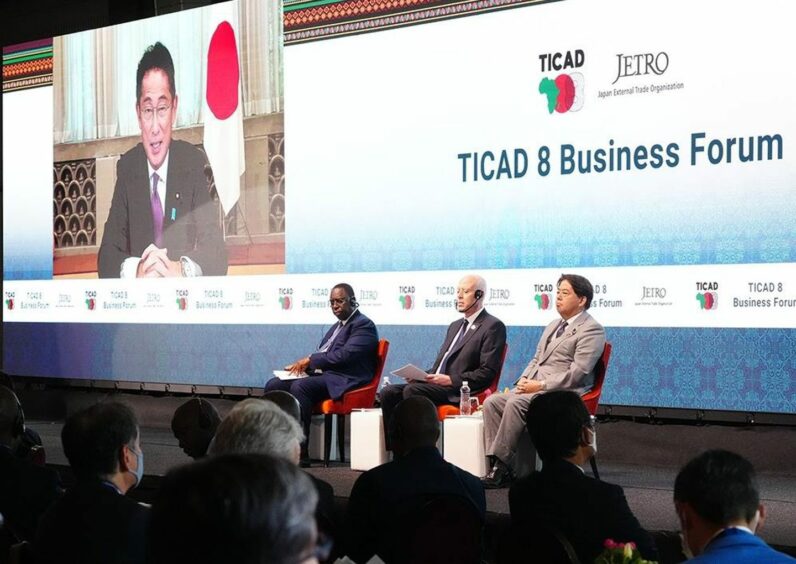
Japanese corporates have signed around 90 agreements with African investors at the recently concluded 8th Tokyo International Conference on African Development (TICAD) in Tunisia.
Many of these focused on energy and the provision of Japanese technology or expertise. The TICAD event showcased Japanese spending commitments to Africa of $30 billion.
Japanese Prime Minister Fumio Kishida was unable to attend in person owing to a COVID-19 diagnosis. However, in a video message, he said Japan and Africa were “partners who grow together”.
The Japanese government has established the $4bn Green Growth Initiatives with Africa. This has the aim of using “Japanese technologies to accelerate green growth by capturing Africa’s enormous potential for green growth and addressing its adaptation needs”, Kishida said.
In his concluding remarks, the prime minister said Japan would provide up to $5bn through co-operation with the African Development Bank (AfDB).
MoU mania
Sojitz Corp. signed a memorandum of understanding (MoU) with Helios Investment Partners, with a focus on sustainable development. The Japanese company signed up to a 25% stake in Axxela earlier this year, in its first significant African investment. Helios owns the Nigerian gas distributor.
Sojitz said the MoU would expand businesses in Nigeria and other African states. The two companies aim to find synergies in a range of industries including energy. This covers gas, electricity and new feedstocks such as hydrogen and ammonia.
Mizuho Bank also signed an MoU with Africa Finance Corp. (AFC). This partnership aims to create collaborations on “project & infrastructure finance, trade finance and treasury”. The statement also noted an interest in “sustainable economic growth in Africa and Asia”.
The two companies said they would co-finance infrastructure partners, including in energy. Mizuho will provide access to Japanese and Asian capital markets, while AFC will support business in Africa.
“Asia and in particular, Japan, are key to Africa’s next phase of growth and structural transformation,” said AFC president and CEO Samaila Zubairu. “We are delighted to forge a new partnership today with Mizuho Bank, one of the largest financial institutions in Japan.”
Mizuho also signed deals with Namibian Investment Promotion and Development Board (NIPDB) and South Africa’s Standard Bank on ESG. The Japanese bank said both deals touched on aspects of green hydrogen.
New gas plans
Itochu Corp. signed an MoU with Sasol to study and develop the market and supply chain for green ammonia. The two said they would examine this as a bunkering fuel and for power generation. Itochu might participate in Sasol’s green ammonia export projects in South Africa.
Mitsubishi UFJ Financial Group (MUFG) also collaborated in drafting the MoU, although it is not part of the deal.
Mitsubishi signed a deal on gas utilisation in Senegal, with Petrosen and Çalık Enerji Sanayi ve Ticaret. The plan covers a feasibility study and proposal for a fertiliser plant. Mitsubishi also signed an MoU wth Çalık Enerji and Bboxx on commercialising minigrid plans.
Jogmec amended an existing MoU with Namibia, on decarbonisation and green hydrogen.
Mitsui Sumitomo Insurance signed up with Global Alliance Seguros on the provision of insurance to Japanese companies in energy projects in Mozambique.
Toshiba Energy Systems signed on with KenGen for operations and maintenance (O&M) on geothermal plants in East Africa.
Toyota Tsusho signed a number of deals: in Tunisia on renewable energy, in Kenya with the Kenya Investment Authority on a solar project and hydrogen, and in Egypt around the Suez Canal.
Transition talks
A declaration from TICAD noted that Africa was responsible for only 3% of historic emissions.
“We call on the international community to honour their commitment to support universal energy access and just transition, through implementing a transformative adaptation and mitigation agenda,” the declaration said. It highlighted opportunities around hydrogen and renewable energy.
While some of the MoUs signed involved Japanese support for gas projects, this level of support did not make it into the official declaration.
While TICAD was largely positive, the appearance of Polisario representatives sparked outrage from Morocco. Japanese officials were forced to say they did not approve of the Western Saharan group’s presence. Morocco boycotted the event and withdrew its ambassador to Tunisia.
The next TICAD event will be held in Japan in 2025.
